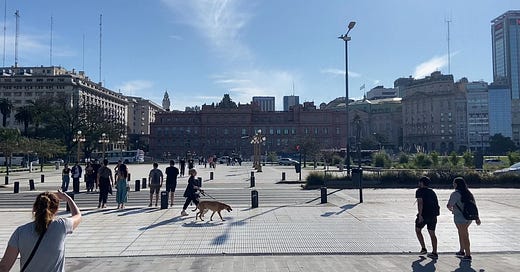“Every normal man must be tempted, at times, to spit on his hands, hoist the black flag, and begin slitting throats.”
―H.L. Mencken, Prejudices First Series (1919)
Joel Bowman with today’s Note From the End of the World: Buenos Aires, Argentina…
President Fernando De la Rúa was not yet half way through his first term in office when, in December of 2001, he was obliged to leave La Casa Rosada rather abruptly.
The violence outside in the iconic Plaza de Mayo had reached fever pitch by the time the Air Force helicopter landed on the roof of the presidential office. Images of the nation’s leader being airlifted to safety over the heads of rioting masses were quickly broadcast around the world. It looked to many as though Argentina, once one of the most prosperous countries on earth, was on the verge of becoming a failed state.
What had began as an ominous cacerolazo (Argentine-style protest where citizens bang pots and pans to express their disgust with their reliably corrupt political caste) a few days earlier, soon grew into full blown civil unrest. The angry mob rallied behind their unifying battle cry, shouting in unison:
“¡Que se vayan todos!” (“All of them must go!")
This electrifying moment in time was not isolated, of course, but was rather the culmination of years of seething discontent, known as the Argentine Great Depression (1998-2002). During this period, the citizenry, confused and abused by their overlords, were subject to no fewer than five acting presidents.
The proximate cause of the December crisis was the imposition of the so-called “Corral” policies, which essentially restricted people’s ability to withdraw their own savings from banks. Staring down the barrel of yet another currency devaluation, prudent Argentines (who had seen this story before) were draining their bank accounts of pesos in order to convert them into something… anything… before their rapacious government once again devalued them.
On December 1, 2001, in order to stem the accelerating outflow, the government froze all private bank accounts for 90 days, allowing for only a small “weekly ration” withdrawal of 250 pesos.
At the time, the Argentine peso was pegged to the US dollar at a 1:1 rate. By the time banks were reopened months later, under the new president Eduardo Duhalde, the exchange rate had spiked to 4:1. Argentines who had seen their money corralled by the state, woke to find it worth a quarter of its previous value.
A freshly fleeced population could not longer withdraw $250 per week… not because of a new limit… but because they no longer had any dollars. In other words, there was nothing left to corral.
The corralito was renamed corralón (meaning “vacant lot,” or “empty building”). If ever there was a time to hoist the black flag…
And now for your Notes From the End of the Week…
Final Notes…
It’s been about 15 months since we embarked on this little Notes journey and, thanks to the generosity of our Members, we’ve been able to parlay our scribbles into something that threatens to become a full time endeavor.
In fact, we’re now read in all 50 US States and across 137 countries around the world. Consider us chuffed.
In fact, it’s thanks to our generous members’ support that we’re able to host our next virtual summit. Notes readers are cordially invited to register for the event for FREE right here:
NB: As usual, space for the live event will be limited, and paying Notes Members will be given preference. They’ll also receive a full audio-video recording of the event, plus a downloadable PDF transcript, to review at their leisure.
If you’re not already a Member, you can correct that calamitous oversight easily enough, right here…
We hope you can join us on the day for what promises to be a lively and informative discussion with some fantastic speakers.
Whatever you’re up to this weekend, we hope you’re enjoying it in good cheer and better company.
And, as always, stay tuned for more Notes From the End of the World…
Cheers,
Joel Bowman
















Share this post